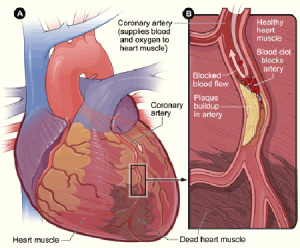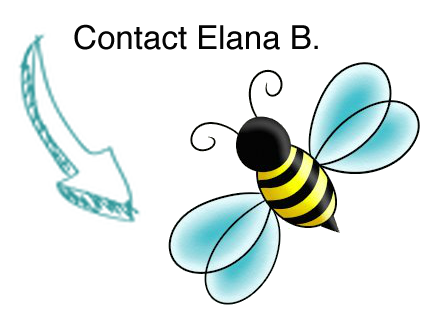Regardless of age, the sooner you begin reducing your risk of having a heart attack, the longer and stronger your heart will be. So what’s the secret to heart attack prevention?
Well, the best way is by educating and implementing a good physical exercise program, incorporating a healthy nutritional diet, limiting alcohol, and avoiding smoking. For most people, it’s pretty straight forward.
Does that mean it’s easy? Not necessarily.
The average American diet has way too many prepackaged, sodium-filled, and bad cholesterol foods to make it completely easy. But if you plan ahead, shop for fresh fruits, vegetables, lean meats and healthy fiber-rich foods, and stay away from cigarette smoke and smoking, as well as exercise on a regular basis, you can certainly greatly limit your chances of suffering a heart attack.
 What is a heart attack?
What is a heart attack?
During a heart attack, the heart muscle loses its blood supply and starts to suffer injury. How much damage occurs depends on the size of the area that is supplied by the blocked artery, as well as the lapse in time between injury and treatment.
A heart attack happens when the flow of oxygen-rich blood to a section of heart muscle suddenly becomes blocked and the heart can’t get oxygen. If blood flow isn’t restored quickly, the section of heart muscle begins to die.
If you know you’re at higher risk of a heart attack due to circumstances beyond your control, pay close attention to lifestyle factors that you can control and change to cut your risk of heart attack.
Other names for a heart attack are: myocardial infarction, cardiac infarction and coronary thrombosis.
What puts me at risk of a heart attack?
Men have a greater risk of heart attack than women do, and they have attacks earlier in life. After menopause, women’s death rate from heart disease significantly increases.
Other risk factors of suffering a heart attack: If you have a close relative such as a parent or sibling who developed heart disease prematurely and who had a heart attack. Despite the fact of having a family history of heart disease does not necessarily mean that you are doomed to suffer their fate. While it could be genetic, it could also be that “they had a bad lifestyle” and that’s what really caused their heart problems. A healthy lifestyle, regular check-ups, and paying attention to your overall health and wellness can help. So what else raises my chance of having a heart attack?
 • Cholesterol levels, especially high LDL (bad cholesterol) and low HDL (good cholesterol) could lead to heart problems and a greater risk of heart attack. So if your total cholesterol is rising, so is your risk of heart disease.
• Cholesterol levels, especially high LDL (bad cholesterol) and low HDL (good cholesterol) could lead to heart problems and a greater risk of heart attack. So if your total cholesterol is rising, so is your risk of heart disease.
• About one in three adults in America has high blood pressure, according to the Center for Disease Control. High blood pressure, also known as hypertension, makes the heart work harder to pump blood. Additionally, hypertension increases your risk of stroke, heart attack, kidney failure, and heart failure. Fortunately, high blood pressure can be controlled with medication. Furthermore, losing weight, becoming more active, eating less salt, and drinking less alcohol can all help to lower your blood pressure.
• Age. If you’re a man older than 45 or a woman older than 55, the unfortunate truth is that you’re more likely to suffer a cardiovascular condition. According to the National Institute on Aging, this can also be attributed to high blood pressure.
• Tobacco. Heart attacks and other cardio conditions can be more prevalent among smokers and individuals exposed to secondhand smoke for a long time.
• Diabetes. Insulin is a hormone secreted by your pancreas. This is essential for the body in order to properly use a form of sugar called glucose. Improper insulin production or processing can cause your blood sugar levels to rise. Consequently, this can increase your heart attack risk.
• Triglyceride levels. A high level of low-density lipoprotein (LDL) cholesterol ( “bad” cholesterol) is most likely to narrow arteries. However, a high level of high-density lipoprotein (HDL) cholesterol (“good” cholesterol) lowers your risk of heart attack.
• Being a couch potato. Lack of physical activity and an inactive lifestyle contributes to high blood cholesterol levels and obesity. People who get regular exercise (especially aerobic exercise) have better cardiovascular fitness, which decreases their overall risk of heart attack.
• Obesity. Obesity is associated with high blood cholesterol levels, high triglyceride levels, high blood pressure and diabetes.
• Stress. Constantly filled with stress and/or anxiety significantly increases your risk of a heart attack. Try yoga or meditation.
• Preeclampsia. This condition is common among women in their 20th month of pregnancy. It can cause high blood pressure, which is known to increase heart disease risk among individuals.
• Illegal drug use. Using stimulant drugs, such as cocaine or amphetamines, can cause a heart attack.
• An autoimmune condition, such as rheumatoid arthritis or lupus. Conditions like these that weaken or challeng your immune system can increase your risk of having a heart attack.
• Improper diet. Proper nutrition is a fundamental element in maintaining good overall health.A diet rich in natural, organic foods, such as: fruits, vegetables, fish, lean protein, and whole grains, as well as plenty of water, and low in refined sugars and carbohydrates is key to maintaining heart health.
• Abuse of alcohol. A small amount of alcohol is okay for some people. If you have a preexisting condition which prohibits alcohol use, you can only damage yourself by partaking. Alcohol such as red wine has some benefits but this is in moderation. If you don’t need an occasional drink, it is better to avoid alcohol altogether.
Consult your doctor before using any health treatment, plan, or activity — including herbal supplements and natural remedies. Also, tell your doctor if you have a serious medical condition or are taking any medications. The information presented here is for educational purposes only and is in no way intended as substitute for medical counseling.
Thanks for reading! If you want to read more, check out our guide to yoga and health. Also, don’t forget to Become a Member of our mailing list so you can be notified as soon as new articles are published.







